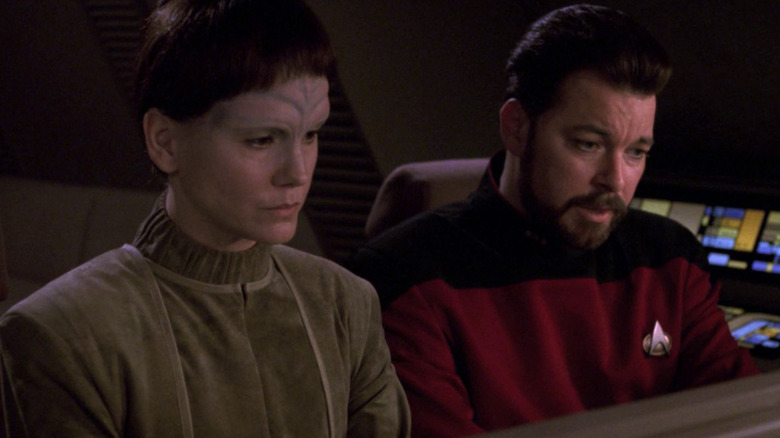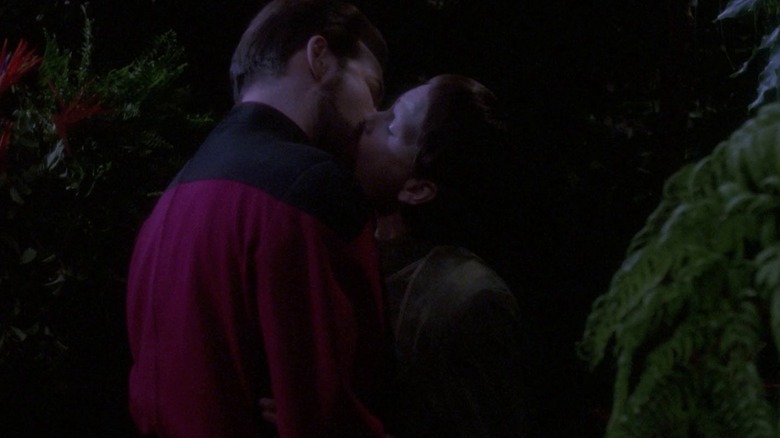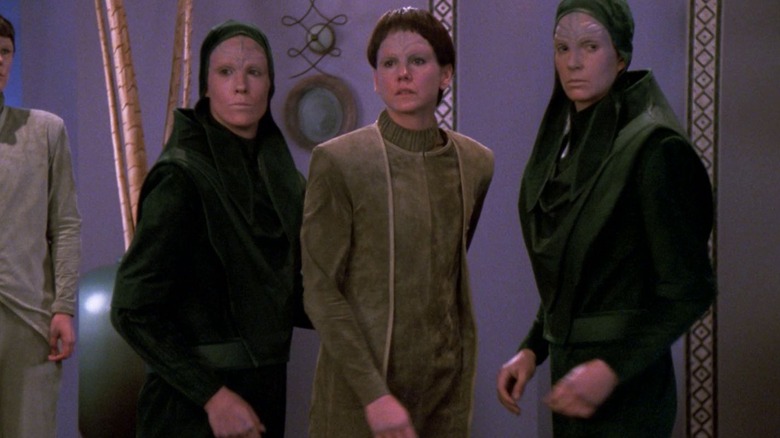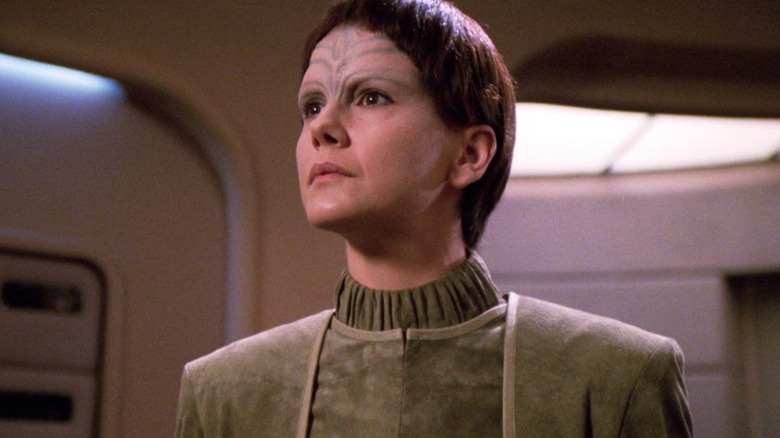Jonathan Frakes Doesn't Think Star Trek Went Far Enough With The Next Generation's LGBT Episode
In the "Star Trek: The Next Generation" episode "The Outcast" (March 6, 1992), the crew of the Enterprise aids a species called the J'naii in locating and rescuing a missing shuttlecraft. The J'naii are a genderless species, claiming to have evolved past specific gender identities. In their society, any expression of maleness or femaleness is considered darkly taboo, and gendered sexual contact has been criminalized. Commander Riker (Jonathan Frakes) spends a great deal of the episode working with a J'naii pilot named Soren (Melinda Culea) and the two bond. Soren will eventually reveal that she feels more female than genderless and that she is attracted to Riker. When Soren's gender identity reaches the other J'naii officials, she is threatened with the sci-fi equivalent of a conversion camp.
By today's politics, "The Outcast" feels clumsy in its attempts to discuss gender identity. It can, however, be commended for even attempting to tell a trans story in a mainstream sci-fi context as early as 1992.
"The Outcast" was a response to a concern that "Star Trek" didn't feature enough explicitly queer stories and that queer characters rarely appeared in the franchise. Only very occasionally would the Enterprise encounter an androgynous species (the Bynars, for instance) or allude to the fluid nature of gender (Data's child Lal is permitted to select their own gender and appearance in "The Offspring"), and there was hardly ever any explicit references to queer sex. "The Offspring" was the franchise's attempt to redress that failing and it only partially succeeded.
In the oral history book "Captains' Logs" edited by Mark A. Altman and Edward Gross, Frakes went on record saying that "The Offspring" wasn't nearly queer enough.
Trek's fraught queer history
"Star Trek" is often touted for its progressive attitudes and themes of multiculturalism, but when it comes to LGBTQ characters, it's often fallen short. Some apologists might argue that the franchise's future was so welcoming to queer people that their sexuality was no longer mentioned, but in never mentioning queer people, they are being explicitly erased. When it came to relationships, "Star Trek" was frustratingly heteronormative. On "Star Trek: Deep Space Nine," Jadzia Dax (Terry Farrell) was perhaps the first kinda-queer representation in the franchise. Jadzia was a humanoid woman with a long-lived sentient worm living in her stomach that gets reimplanted in a new host every 70 years or so. The symbiote — Dax — had been male and female in its life, and many queer and trans viewers appreciated the character's fluidity.
When it came to "The Outcast," it was pushed especially hard by writer and supervising producer Jeri Taylor. She was clear in her desire to write a sci-fi version of a queer rights story. In the early '90s, Taylor felt that those kinds of stories weren't common enough on network TV. She was quoted in "Captains' Logs" as saying:
"It came out of staff discussion. We had wanted to do a gay rights story and had not been able to figure out how to do it in an interesting science-fiction, 'Star Trek'-ian way. It came up with the idea of turning it on its ear and I really wanted to do it because, partly, it would be controversial and I welcome that. The idea of any drama is to touch people's feelings and engage them, whether you make them laugh, cry, angry."
But, Taylor was quick to point out, she isn't queer, and may have been underqualified to write such a story.
Not gutsy enough
One could say that "The Offspring" doesn't hit as hard as it does because of its casting. The J'naii are supposed to be genderless, but Soren was played by a cis female actor. Ultimately, when Riker and Soren kiss, audiences are just watching a cishet man and a cishet woman kissing. The themes are queer, but there's technically no queer kiss on camera. Frakes felt that the episode would have been stronger if Soren had been played by a cis male actor (this was long before Paramount casting directors would have thought to seek nonbinary performers):
"I didn't think they were gutsy enough to take it where they should have. [...] Soren should have been more obviously male. We've gotten a lot of mail on this episode, but I'm not sure it was as good as it could have been ... if they were trying to do what they call a gay episode."
In other words: make it gay, you cowards.
"The Outcast" has been the subject of a lot of discussions, and a 2001 article in Salon recorded some fan reactions nine years after its airing. Some queer viewers noted that the strictly enforced genderlessness of J'naii society could be traced as a parallel to bigoted right-wing monsters like Rush Limbaugh. In both cases, there was a call to erase alternate sexualities from the spectrum and force people to rid themselves of queer sexual desire.
Others felt a little disappointed that "Star Trek" had to dabble with sci-fi symbolism at all. Why must gender fluidity, nonbinary people, and queer sexuality all be couched in metaphor? Why not just ... tell a queer story? It felt like an evasion.
The old guard of straight guys
Would Frakes have kissed a male actor on camera? In "Captains' Logs," writer Brannon Braga thought so. Male-male kisses were staggeringly uncommon on TV in 1992, so it would have been considered a "daring" move for a straight actor to make. Braga agreed with Frakes, though, that "The Outcast" could have gone much further:
"The risks were what Jeri did with the gems of the episode, like talking about sexual organs on the shuttlecraft. I felt they could have gone further [and] Picard could have been less passive. Riker's a big boy and he sparks conflicts in ethics among the characters. To get someone in there [who's] a catalyst for conflicts among our characters is a rare thing."
The fact remains that "The Next Generation" was overseen by a bunch of old cishet men who didn't realize they hadn't included any queer characters on their show until viewers wrote in to point that out to them. Producer Michael Piller recalled talking to show creator Gene Roddenberry — shortly before he died in 1991 — about the possibility of including a queer character on the show, and Gene only considered depicting two men holding hands in a scene.
Producer Rick Berman felt it was a fine story about intolerance. He also admitted "The Outcast" was ultimately a half-measure:
"It did not satisfy certain [people in] the gay and lesbian community because it was not what they were asking for, which was to introduce a gay or lesbian character in a normal and acceptable way as one of the members of the crew. But I think it did deal with the issue of intolerance towards sexual orientation and it met that objective well."
"Star Trek: Discovery," meanwhile, has five queer main characters.



